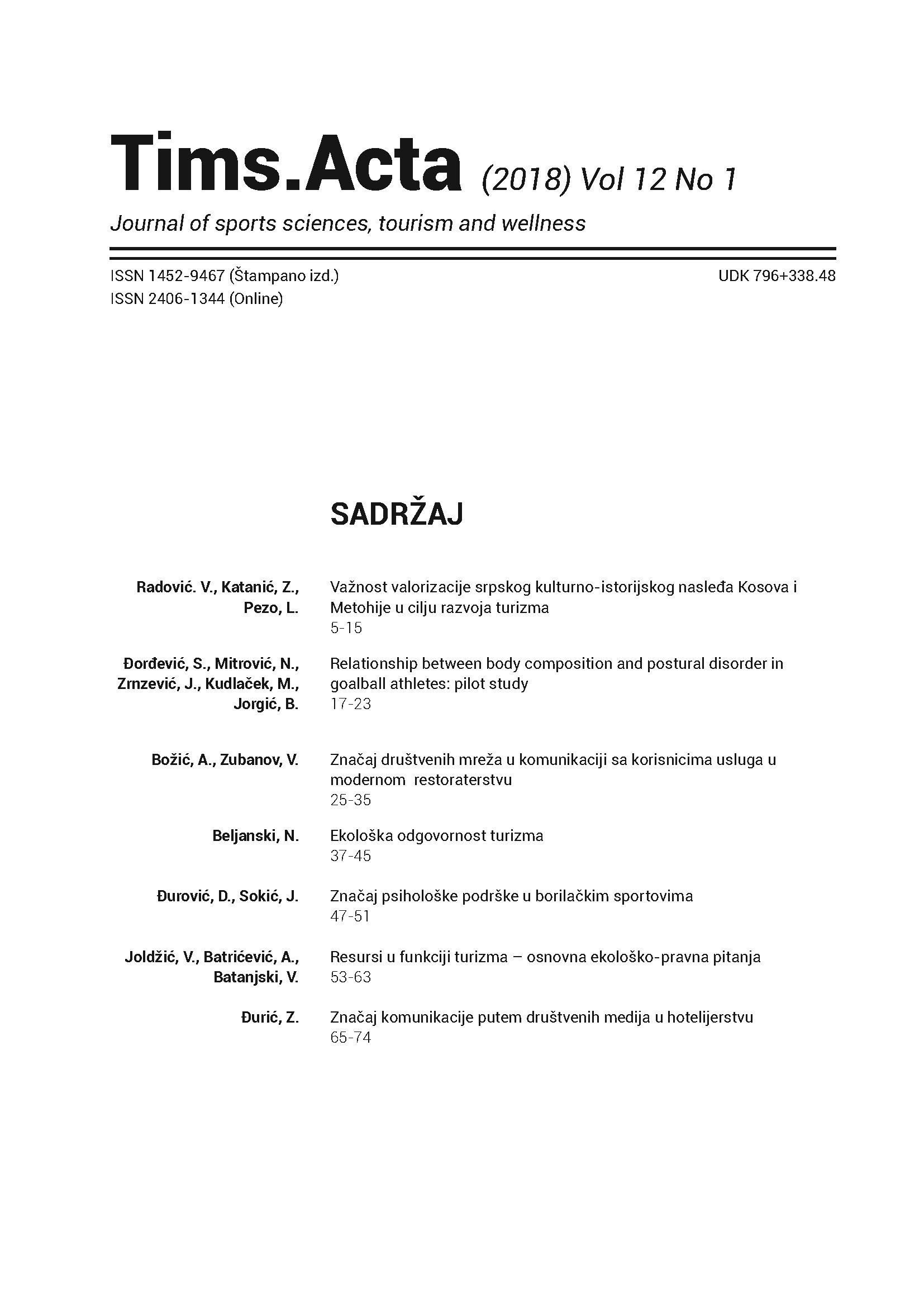ZNAČAJ PSIHOLOŠKE PODRŠKE U BORILAČKIM SPORTOVIMA
Sažetak
Pregled psiholoških istraživanja u oblasti sporta, dosledno pokazuje važnost i efikasnost psihološke pripreme u unapređivanju sportskog nastupa. Rezultati istraživanja koja su se bavila psihološkim faktorima uspešnosti u borilčkim sportovima ukazuju na najznačajnije psihološke veštine koje je neophodno razvijati, a koje doprinose uspešnosti u borilačkim veštinama: koncentracija i fokusirana pažnja, samopouzdanje, relaksacija, regulacija uzbuđenja i napetosti, kontrola anksioznosti, vizualizacija i unutrašnji govor. Individualni pristup u procesu savladavanja psiholoških tehnika i prilagođavanje personalnim karateristikama sportiste pokazali su se kao efikasniji od grupnog.
Ključne reči: psihološke veštine, borilačke veštine, individualni pristup, sportski nastup, karate
Reference
Arvin, H. (2007). Motoric and psychological skills among elite karate male athletes. In Proceeding of the 1st International Islamic world science & sport conference.
Blumenstein, B., Lidor, R., & Tenenbaum, G. (2005). Periodization and planning of psychological preparation in elite combat sport programs: the case of judo. International Journal of Sport and Exercise Psychology, 3, 7-25.
Chapman, C., Lane, A. M., Brierly, J. H., & Terry, P. C. (1997). Anxiety, self-confidence and performance in Tae Kwon-do. Perceptual and Motor Skills, 85, 1275-1278.
Columbus, P. J., & Rice, D. (1998). Phenomenological meanings of martial arts participation. Journal of Sport Behavior, 21, 16-29.
Durand-Bush, N., & Salmela, J. H. (2002). The Development and Maintenance of Expert Athletic Performance: Perceptions of World and Olympic Champions. Journal of Applied Sport Psychology, 14, 154-171.
Fayaz, M. (2009). Psychological characteristics of professional and amateur sportsmen. In Proceeding of the 12thAsian Federation of Sports Medicine Congress.
Ferrari, M. (1999). Influence of expertise on the intentional transfer of motor skill. Journal of Motor Behavior, 31, 79-85.
Fredrick, M. J. (1999). Peak Moments in Sport Karate Tournament Competition: Black Belt Fighters in the Zone. Doctoral Dissertation, University of Utah.
Gould, D., & Damarjian, N. (1996). Imagery Training for Peak Performance. In J. L. Van Raalte & B. W. Brewer (Eds.). Exploring Sport and Exercise Psychology (pp. 3-24). Washington, DC: American Psychological Association.
Gould, D., Guinan, D., Greenleaf, C., Medbery, R., & Peterson, K. (1999). Factors affecting Olympic performance: Perceptions of athletes and coaches from more and less successful teams. Sport Psychologist, 13, 371-394.
Greenspan, M. J., & Feltz, D. L. (1989). Psychological interventions with athletes in competitive situations: A review. The Sport Psychologist, 3, 219-236.
Hacker, C. (2000). Psychological pressure and effectiveness in sports. Retrieved 11.05.2017. from http://www.eteams.active.com/soccer/instruction/psych/article.cfm
Hard, R. T. (1983). Sparring Principles. Unpublished Doctoral Dissertation, University of Arkansas.
Kauss, D. (2001). Mastering Your Inner Game. Champaign, IL: Human Kinetics.
Khatamsa, S. (2002). The importance of mental superiority for success in karate sport. In Proceeding of the 12th Asian Federation of Sports Medicine Congress.
LeUnes, A., & Nation, J. R. (2002) Sport psychology (3th ed.). Pacific Grove, CA: Wadsworth.
Nešić, M., Nešić, B., & Kovačević, J. (2012). Self-defence techniques as an instrument of competitor's development in karate sport. Sport Science, 2, 87-91.
Orlick, T. (1986). Psyching for Sport. Champaign, IL: Leisure Press.
Seabourne, T., Weinberg, R., & Jackson, A. (1984). Effect of individualized practice and training of visuo-motor behavior rehearsal in enhancing karate performance. Journal of Sport Psychology, 7(2), 58-67.
Seabourne, T. (1998). The Marital Arts Athlete. Boston, MA: YMAA Publication Center.
Tan, K. S. (2004). Constructing a martial tradition: rethinking a popular history of Karate Do. Journal of Sport Social Issues, 28, 169-192.
Weinberg, R. S., & Comar, W. (1994). The effectiveness of psychological interventions in competitive sports. Sports Medicine, 18, 406-418.
Williams, A. M., & Elliott, D. (1999). Anxiety, expertise, and visual search strategy in karate. Journal of Sport and Exercise Psychology, 21, 362-375.
- Autori zadržavaju autorska prava i pružaju časopisu pravo prvog objavljivanja rada i licenciraju ga "Creative Commons Attribution licencom" koja omogućava drugima da dele rad, uz uslov navođenja autorstva i izvornog objavljivanja u ovom časopisu.
- Autori mogu izraditi zasebne, ugovorne aranžmane za neekskluzivnu distribuciju članka objavljenog u časopisu (npr. postavljanje u institucionalni repozitorijum ili objavljivanje u knjizi), uz navođenje da je članak izvorno objavljen u ovom časopisu.
- Autorima je dozvoljeno i podstiču se da postave objavljeni članak onlajn (npr. u institucionalni repozitorijum ili na svoju internet stranicu) pre ili tokom postupka prijave rukopisa, s obzirom da takav postupak može voditi produktivnoj razmeni ideja i ranijoj i većoj citiranosti objavljenog članka (Vidi Efekti otvorenog pristupa).

